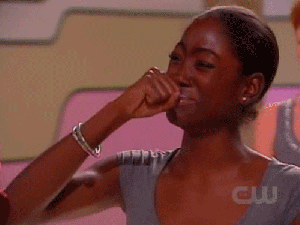I've been very sick. But the internet - that small microcosm of Nigerians, that incredible place where the educated go to reveal their true selves, has made me sicker.
A woman; brilliant, controversial, bold -- came forward with a story of rape more horrific than anything I would wish on my enemy.
There should not have been a single word uttered against her. There should have been ashes and sackcloth and collective grief that eight years passed with this festering evil eating up one of their own, but of course Nigerians showed themselves mighty in the defence of the powerful.
I wish any of the reactions surprised me. But they didn't. And the pain of this -- the pain of this child, this woman who cannot sleep through a night because men thought her a plaything, effectively silenced her with threats of further destruction, broke down the spirit of a child so much that her abuser was the only one she could turn to -- her pain was taken for sport.
Like the snake in the garden, they hissed. Eight years of silence and now this? How much attention does one whore need? Do you not know a lie when you hear it? Sssssslut. Shamelessssss. Dissssgusting.
The gods of the universe fold in on themselves in horror. This is what they created? These creatures, who would pick up the pain of a child in a world that they know is designed to create such pain, and turn it over and over in their hands, to find a crack to prove that it is not really pain? It's just your imagination, you vile, ugly thing. Be quiet. BE QUIET.
That ANYONE would open their mouths and allow these things fall on the head of a child, of a woman surviving, of a human being, is the most heartbreaking thing.
And yet.
AND YET.
None of this surprises me. I have known since I was a child that no woman is rapeable, not before she is raped, not after she is raped, not while she is being raped. I knew it when I was seven, knew it when I was sixteen, knew it when I was eighteen. I knew it and kept my unrapeable mouth shut as men I loved and trusted raped me. There is none of us good enough to be left alone, or good enough to be believed. NONE.
But ENOUGH.
ENOUGH ENOUGH ENOUGH ENOUGH.
The silence has gone on LONG ENOUGH. Does the Earth itself not cry out for us?!
Where is the justice? Where is it that we can go to find safety? WHERE?
I want to scream: What have we done to deserve your hatred? Yes, ALL women. Every single one of us. What did we do to deserve this violence?!
You allow us no safety. Even when all we want is to live, to take back the things you stole from us when you invited yourselves into our bodies, even when we want nothing more than to survive, you hunt us down and grind us into the ground. And some of us join you, and you spit in our faces, are those not women? They are, but they are women deceived, mouths full of the poison of the abuser, eyes sealed shut so that they can pretend to have found safe haven.
We would laugh at you, barbed-tongued woman, if we did not know the truth of your situation. We weep for you, just as we weep for the daughters we are afraid to bear, afraid to let go of, afraid for, because there is no safe haven. Know this: The man whose approval settles on your shoulders hates you just as much as he hates the whore, the bold woman, the woman who dares to claim her name and her life. Push him. I dare you. His violence will spray across your face like acid and you will know that none of us are special to him. Especially not you, a woman who dares to forget her place. Know this.
It is enough.
Our blood is on your hands. On your fists and your sheets and at the bottom of your beer glasses as you joke and laugh. You can not escape it. It cries out from the depths of the darkness, it cries out for justice, for vengeance. BLOOD FOR BLOOD. LIFE FOR LIFE.
We are weary. The fight is before us, every second of every day. You do not alleviate it. You do not fight for us. You stick your toe in the water and scream it is too hot, too cold, too much. You leave us to it. And yet when we fight you tell us we are too angry, too heartbroken, that we are bleeding all over the carpet and it makes you uncomfortable. SHALL WE CONTINUE TO DIE IN SILENCE FOR YOUR COMFORT? IS YOUR COMFORT WORTH OUR LIVES?
You are demons, walking around wielding a power you have no right to. ENOUGH IS ENOUGH IS ENOUGH. Our mothers died fighting for some room to breathe. Our daughters WILL NOT. This is where it ENDS.
FUCK YOUR COMFORT. FUCK EVERYTHING YOU PREFER TO BELIEVE ABOUT YOURSELF WHEN YOU SHAVE YOUR FACE IN THE MORNING AND WINCE AT THE NICK OF THE BLADE. PRESS THAT BLADE TO YOUR NECK AND KNOW THAT WE ARE COMING FOR YOU. THIS IS A WAR YOU HAVE STARTED, AND BY GOD IT WILL END.
Demon, know this. The curses are laid. The fight has begun. You drew the line. We have crossed it. There is no more comfort for you. This is war.






